|
De Albanese schrijver Fatos Kongoli werd geboren op 12 januari 1944 in Elbasan. Zie ook alle tags voor Fatos Kongoli op dit blog.
Uit: The Loser (Vertaald door Robert Elsie en Janice Mathie-Heck)
“There comes a day when you get the impression that you’ve paid your dues to the world, the cycle is complete and there’s no more reason to ruminate on the past, in particular when your life has nothing of value to offer.
“What now?” you might ask.
Nothing. Just a confession.
One morning a couple of months ago, a friend of mine, Dorian Kamberi, a mechanical engineer and the father of two children, boarded a freighter called the Partisan and sailed across the Adriatic with his family. If I hadn’t had second thoughts at the last minute, I might be living in some refugee camp in that dreamland called Italy too, or somewhere else in Europe, together with a horde of my countrymen. But at the last minute, as we were sitting on deck squashed like sardines, I told Dori that I was getting off. It’s possible that he didn’t even hear what I’d said. After the trials and tribulations of our journey – a veritable Odyssey – from town to the ship, my words must have sounded absurd. If anyone other than my friend had been beside me, he’d have chucked me into the sea. Dori said nothing and just gave me a blank stare. The whole time, I could feel the warm pee of his little son, who I was still carrying on my shoulders, trickling down the back of my neck.
My hesitation must have been obvious to everyone. I’m sure that my voice and my face expressed exactly the opposite of what I was saying. Even a small attempt on Dori’s part to dissaude me would have been enough to cause me to abandon the decision I’d just taken, not really even knowing why. It wasn’t a question of homesickness. I didn’t feel anything at all, and my mind was as blank as the expression on Dori’s face. He made no move to stop me, and I disembarked,my neck still moist from his son’s soggy nappy. I sat down on the edge of the wharf and looked back at the last groups of refugees scrambling to get on board.”
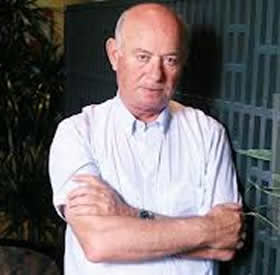
Fatos Kongoli (Elbasan, 12 januari 1944)
De Britse schrijver William Nicholson werd geboren op 12 januari 1948 in Tunbridge Wells, Kent. Zie ook alle tags voor William Nicholson op dit blog.
Uit: The Society of Others
“My life is meaningless. I'm not getting any happier.
My late father says, "Your mother tells me you spend all day shut up in your room."
I say, "She does not lie."
He says, "There's a big wide world out there. You're not going anywhere so long as you stay shut up in your room."
I say, "There's nowhere to go."
He hates that. My negative attitude. I could tell him he's not going anywhere either. But why pop his balloon?
I like my room. I said before I don't want anything, but this isn't entirely true. I want my own room. I don't much care what's in it so long as it has a door I can shut and lock so people don't come asking me to do things. I expect maybe I'll spend the rest of my life in my room, and at the end I'll just die here and no one will find me and that's just fine with me.
This big wide world: first of all, it's not so big and wide. Really the world is only as big as your experience of it, which is not big at all. And what sort of world is it? I would characterise it as remote, uninterested, unpredictable, dangerous, and unjust. When I was small I thought the world was like my parents, only bigger. I thought it watched me and clapped when I danced. This is not so. The world is not watching and will never clap. My father doesn't get this, he's still dancing. It makes me quite sad to see him.”
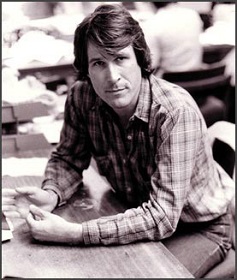
William Nicholson (Tunbridge Wells, 12 januari 1948)
In de jaren 1970
De Duitse schrijver, schilder en componist Florian Havemann werd geboren op 12 januari 1952 in Oost-Berlijn. Zie ook alle tags voor Florian Havemann op dit blog.
Uit: Havemann
„Aber Havemann wird erst richtig zu Havemann in dem Moment, wo der Sohn des Saatguthändlers nicht selber Saatguthändler wird, wo Havemann in meinem Großvater zum Intellektuellen wird. Zu einem, der auf seinen Geist auch seine Existenz zu gründen versucht. Der mit seinem Grips durchkommen will. Was das bedeutet, das wandelt sich, und es ist auch nicht immer eine leichte Sache, es ist auch gefährlich, existenz-bedrohend gefährlich, lebensgefährlich. Das kann es sein. Muß es nicht sein. Aber prekäre Existenz, das ist es immer. Havemann hat studiert.
Mein Großvater Havemann war der erste Havemann, der studiert hat, und auch ich habe studiert. Wenn auch nicht richtig, wenn auch ein Fach, das ich dann als Beruf nie ausgeübt habe. Und auch das ist immer noch Havemann, typisch Havemann. Denn Havemann, das bedeutet, sich nicht auf einen Beruf festzulegen. Auf einen Beruf allein. Mein Großvater war Gymnasiallehrer, mein Großvater war Zeitungsschreiber, war Redakteur, mein Großvater wurde dann Geologe. Mein Großvater hat philosophische Bücher geschrieben, mein Großvater hat Theaterstücke geschrieben, Romane. Mein Vater hat als Naturwissenschaftler gearbeitet, mein Vater war technischer Assistent in einem Krankenhaus, mein Vater war Erfinder. Mein Vater hat eine Widerstandsgruppe gegründet. Mein Vater war Parlamentsabgeordneter, mein Vater hat auf seine Weise Politik gemacht, mein Vater war der Anführer der Opposition in einem Staat, der offiziell keine Opposition zuließ.“
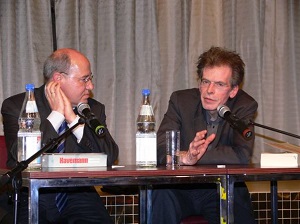
Florian Havemann (Oost-Berlijn,12 januari 1952)
Hier met de Duitse politicus Gregor Gysi (links)
De Amerikaanse schrijver Jack London (eig. John Griffith Chaney) werd geboren op 12 januari 1876 in San Francisco, Californië. Zie ook alle tags voor Jack London op dit blog.
Uit: The Sea Wolf
“Why, if there is anything in supply and demand, life is the cheapest thing in the world. There is only so much water, so much earth, so much air; but the life that is demanding to be born is limitless. Nature is a spendthrift. Look at the fish and their millions of eggs. For that matter, look at you and me. In our loins are the possibilities of millions of lives. Could we but find time and opportunity and utilize the last bit and every bit of the unborn life that is in us, we could become the fathers of nations and populate continents. Life? Bah! It has no value. Of cheap things it is the cheapest. Everywhere it goes begging. Nature spills it out with a lavish hand. Where there is room for one life, she sows a thousand lives, and it's life eats life till the strongest and most piggish life is left.”
(…)
““Do you know the only value life has is what life puts upon itself? And it is of course over-estimated since it is of necessity prejudiced in its own favour. Take that man I had aloft. He held on as if he were a precious thing, a treasure beyond diamonds or rubies. To you? No. To me? Not at all. To himself? Yes. But I do not accept his estimate. He sadly overrates himself. There is plenty more life demanding to be born. Had he fallen and dripped his brains upon the deck like honey from the comb, there would have been no loss to the world. He was worth nothing to the world. The supply is too large. To himself only was he of value, and to show how fictitious even this value was, being dead he is unconscious that he has lost himself. He alone rated himself beyond diamonds and rubies. Diamonds and rubies are gone, spread out on the deck to be washed away by a bucket of sea- water, and he does not even know that the diamonds and rubies are gone. He does not lose anything, for with the loss of himself he loses the knowledge of loss. Don't you see? And what have you to say?”
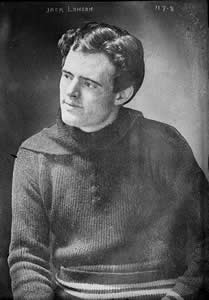
Jack London (12 januari 1876 - 22 november 1916)
De Hongaarse schrijver Ferenc Molnár werd op 12 januari 1878 in een burgerlijk-joods gezin van Duitse afkomst geboren. Zie ook alle tags voor Ferenc Molnár op dit blog.
Uit: Liliom
“Marie
Julie, Julie! [There is no answer.] Do you hear me Julie? Let her be! Come on. Let her be.
(Starts to go back)
[Julie enters, looks back angrily."]
Julie
Did you ever hear of such a thing? What's the matter with the woman anyway?
Marie
[Looking back again.]Here she comes again.
Julie
Let her come. I didn't do anything to her. All of a sudden she comes up to me and begins to raise a row.
Marie
Here she is. Come on, let's run. [Tries to urge her off.]
Julie
Run? I should say not. What would I want to run for? I'm not afraid of her.
Marie
Oh, come on. She'll only start a fight.
Julie
I'm going to stay right here. Let her start a fight.
Mks. Muskat [Entering.]
What do you want to run away for?
[To Julie.] Don't worry. I won't eat you. But there's one thing I want to tell you, my dear. Don't let me catch you in my carousel again. I stand for a whole lot, I have to in my business. It makes no difference to me whether my customers are ladies or the likes of you — as long as they pay their money.But when a girl misbehaves herself on my carousel — out she goes. Do you understand?”
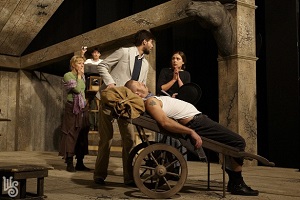
Ferenc Molnár (12 januari 1878 – 1 april 1952)
Scene uit een opvoering in Szombathely, Hongarije
De Franse schrijver Charles Perrault werd geboren op 12 januari 1628 in Parijs. Zie ook alle tags voor Charles Perrault op dit blog.
Uit: Blauwbaard (Barbe Bleue)
Er was eens lang geleden
een schatrijk edelman,
die burchten en kastelen,
zo schoon men denken kan,
bezat; en al zijn kamers
en zalen, ruim gebouwd,
die schitterden en blonken
van marmer brons en goud.
De meubels waren kostelijk
gebeeldhouwd en verguld,
met zilveren serviezen
de kasten opgevuld.
Er hing in elke feestzaal
een lichtkroon van kristal,
kortom: ‘t was louter weelde
en luister overal
En toch, bij al zijn schatten
en overvloed op aard,
speet hem één zaak geweldig:
hij had een blauwe baard.
En zo verschrikkelijk lelijk
stond dit de edelman,
dat, als men hem maar aankeek,
dan schrok men er toch van.
Berijmd door Antoon Leonard de Rop
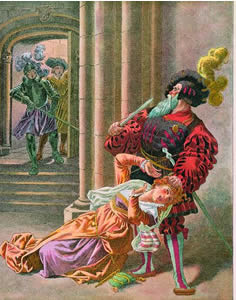
Charles Perrault (12 januari 1628 – 16 mei 1703)
Illustratie door Claude Hirlemann, 1923
|



